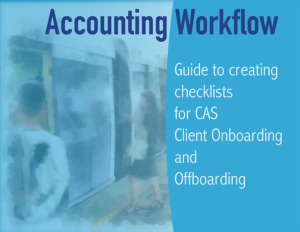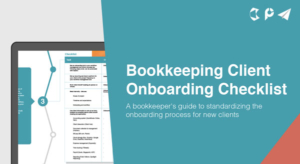This is part four of a five-part series on Workflow in your Accounting Practice. Over the course of this series I’ll walk you through best practices in setting up a workflow system for delivering Client Accounting Services (CAS) and the benefits you can expect once you have it up and running.
Once you have defined your services and organized your practice, it’s time to step away and let your staff do their work; it’s time to delegate. A good workflow system like Aero should make that easy – but when we’re talking about the firm you have invested so many hours in creating, it sometimes isn’t that simple (If you’re a sole proprietor, keep reading– you need to learn how to delegate too!).
Clearly defined procedures pay off
 You have in place clearly defined procedures and service-specific checklists. Everything is scheduled so that you know client work will get done on time. But, somehow it’s hard to get past the fear things might fall apart without your constant supervision. Here’s where you need to remind yourself that your staff are trained, intelligent people who want to do great work and don’t want to be micromanaged. The clearly defined procedures and perfectly organized tasks empower your staff to do their work without constant supervision. And, the visibility a good workflow system provides job status information to you without interrupting your staff.
You have in place clearly defined procedures and service-specific checklists. Everything is scheduled so that you know client work will get done on time. But, somehow it’s hard to get past the fear things might fall apart without your constant supervision. Here’s where you need to remind yourself that your staff are trained, intelligent people who want to do great work and don’t want to be micromanaged. The clearly defined procedures and perfectly organized tasks empower your staff to do their work without constant supervision. And, the visibility a good workflow system provides job status information to you without interrupting your staff.
In addition, having a clearly visible system gives staff a framework to add their knowledge and experience to the firm’s reservoir of knowledge capital. This is where your firm starts to realize the benefits of a workflow system that enables delegation. Your happy, empowered staff can offer suggestions and improvements to the firm’s processes and procedures, benefiting the entire firm – and your bottom line.
Delegate interruptions
You may start each day with a neatly defined and organized list of things to do, but inevitably the phone rings or your inbox fills with ‘urgent’ emails from clients. Without a plan for dealing with these interruptions, a process for delegating them to another person or time, your day will be hijacked and you’ll be left wondering what happened. Maybe your plan is to delegate reading emails to a certain time of day or assign the task of sorting through emails to a certain person. Perhaps you have a policy of answering client phone calls right away but delegating any work they generate to a staff person or another time. Whatever your plan is, make sure it is clearly defined and communicated to both clients and staff– and then stick to it. Otherwise, you may find that the important work of managing your firm is soon buried by all those ‘urgent’ interruptions.
Focus on managing your practice
Freeing your staff to work without interference and planning for inevitable interruptions allows you to focus on the bigger picture and position your firm for the future. Now that you have defined, organized, and delegated, you are ready to use your workflow system to manage your practice.
Up Next: Practice Management
A version of this was originally published on Insightful Accountant











